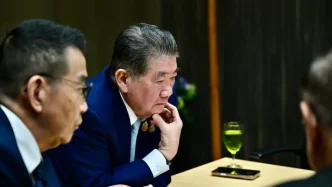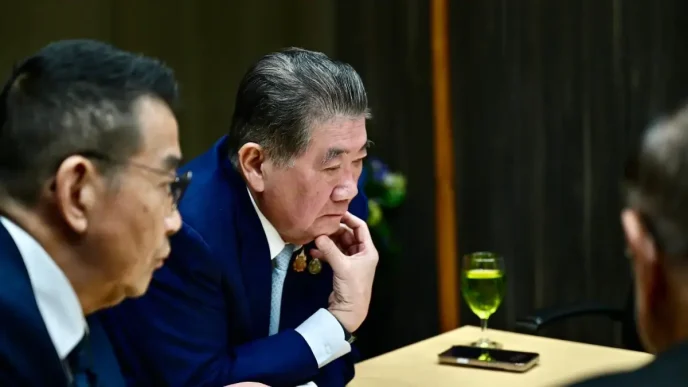In a surprising turn of events at the heart of Philippine politics, Representative Nicanor Briones of the AGAP Party-list has found himself under scrutiny after being caught watching a cockfight practice video on his phone during a plenary session of the House of Representatives. The incident, which occurred during the House speaker vote on July 28, 2025, has sparked calls for an ethics investigation, raising questions about decorum and public accountability among the nation’s lawmakers.
A Breach of Decorum in Congress
The controversy erupted when Briones was observed viewing the video during a formal session, a moment meant to reflect the gravity of legislative duties. Cockfighting, locally known as “Sabong” holds deep cultural significance in the Philippines, often tied to traditional derbies and community events. However, its association with gambling and recent legal restrictions on online sabong has made it a contentious issue, especially when linked to public officials.
Briones has since admitted to watching the video, explaining that it was sent by a relative encouraging him to purchase a rooster for a traditional derby. He was quick to clarify that he does not participate in online sabong or traditional cockfighting events, aiming to distance himself from any implication of wrongdoing. Nevertheless, the incident has drawn significant attention, with critics arguing that such behavior is inappropriate in the hallowed halls of Congress.
Ethics Committee Responds
Representative JC Abalos of the 4Ps Party-list, who chairs the House Committee on Ethics and Privileges, addressed the issue on August 1, 2025, emphasizing that the matter is being taken seriously. In an online interview with the media, Abalos underscored the committee’s commitment to its duties, stating that the incident would not be ignored. While the ethics committee has yet to be fully constituted, with members still to be appointed, Abalos assured the public that an investigation could be on the horizon once proper channels are established.
Abalos also highlighted the importance of maintaining decorum not only within the plenary hall but also in lawmakers’ conduct outside Congress. He stressed the need for public accountability, noting that the expectations of the Filipino people must be met with integrity and professionalism. To prevent premature judgment, he refrained from offering personal opinions on the specifics of the incident, insisting that any decision must be based on facts and follow correct procedural steps.
In a forward-thinking move, Abalos proposed the creation of an independent body to handle complaints of ethical misconduct by lawmakers. This body would advise the ethics committee on appropriate actions, aiming to bolster transparency and accountability within the chamber. Such a proposal reflects growing concerns about the mechanisms in place to address breaches of conduct, especially as public scrutiny of political figures intensifies in the digital age.
Broader Implications for Legislative Conduct
The incident has ignited a wider debate about the behavior expected of public officials in the Philippines. Representative Rolando Valeriano of Manila’s 2nd District, who chairs the House Committee on Public Order and Safety, was among those who condemned the act, describing it as improper and out of place during a legislative session. His comments echo a sentiment shared by many who view the episode as a lapse in judgment that undermines the credibility of Congress at a time when public trust in institutions is already fragile.
Cockfighting, while a longstanding tradition in rural and urban communities alike, has been a polarizing topic in recent years. The rise of online sabong platforms during the COVID-19 pandemic led to a surge in gambling-related issues, prompting the government to impose stricter regulations. In 2022, then-President Rodrigo Duterte ordered a suspension of online cockfighting operations due to concerns over social ills and illegal activities. Although Briones has denied any involvement in such platforms, the optics of a lawmaker engaging with cockfighting content during official proceedings have fueled public discontent.
Political Context and Public Perception
The timing of the incident adds another layer of complexity. The House speaker vote on July 28, 2025, was a critical moment in shaping the leadership dynamics within Congress, a process that demands focus and respect for democratic procedures. For a lawmaker to be visibly distracted by personal matters during such an event raises questions about priorities and commitment to public service. This incident comes against the backdrop of ongoing efforts to strengthen governance and combat corruption in the Philippines, where lawmakers are often under intense scrutiny for their actions both inside and outside the legislative arena.
Public reaction, as reflected in local media coverage, has been mixed. Some Filipinos view cockfighting as an integral part of cultural heritage, with traditional derbies seen as social events rather than mere gambling opportunities. Others, however, argue that lawmakers must uphold a higher standard of behavior, especially in light of the controversies surrounding sabong. The incident has also reignited discussions about the need for stricter guidelines on the use of personal devices during plenary sessions, with some advocating for policies to prevent distractions and ensure that lawmakers remain focused on their duties.
Challenges Ahead for the Ethics Committee
As the House Committee on Ethics and Privileges prepares to address the incident, several challenges loom large. The committee’s composition is still incomplete, which could delay formal proceedings. Additionally, the cultural nuances surrounding cockfighting complicate the ethical considerations at play. While watching a video may not constitute direct participation in sabong, it risks normalizing behavior that many associate with gambling and other societal issues—a perception that could tarnish the reputation of Congress as a whole.
Abalos’s call for an independent advisory body signals a potential shift toward more robust oversight mechanisms. If implemented, such a body could provide impartial guidance on complex cases, ensuring that investigations are conducted fairly and without political bias. This proposal aligns with broader regional trends in Southeast Asia, where governments and institutions are increasingly adopting transparency measures to rebuild public trust. For instance, neighboring countries like Thailand and Indonesia have introduced reforms to enhance accountability among public officials, often in response to high-profile scandals.
Legal and Ethical Dimensions
From a legal standpoint, watching a cockfight video does not appear to violate any specific Philippine law, particularly since Briones has denied involvement in gambling or online sabong. However, the ethical implications are significant. The House of Representatives operates under a code of conduct that emphasizes professionalism and respect for the institution’s dignity. Breaches of decorum, even if not criminal, can lead to sanctions or reprimands through the ethics committee, serving as a reminder of the standards expected of elected officials.
Comparatively, other Southeast Asian nations have grappled with similar issues of parliamentary conduct. In Malaysia, for instance, lawmakers have faced criticism for inappropriate behavior during sessions, prompting calls for stricter enforcement of ethical guidelines. In the Philippines, where political controversies often dominate headlines, the cockfight video incident risks becoming a symbol of broader systemic challenges unless addressed transparently.
Looking Forward
As the House of Representatives moves toward a potential ethics probe, the outcome of this incident could set a precedent for how breaches of decorum are handled in the future. For Representative Briones, the scrutiny may serve as a cautionary tale about the intersection of personal actions and public responsibility. For the ethics committee, under the leadership of Representative Abalos, the case presents an opportunity to demonstrate a commitment to accountability at a time when public faith in governance is paramount.
The broader question remains: how will Congress balance cultural traditions with the demands of modern governance? As the investigation unfolds, its implications for legislative conduct and public perception will likely resonate beyond the walls of the House, shaping the narrative of political accountability in the Philippines for years to come.
















